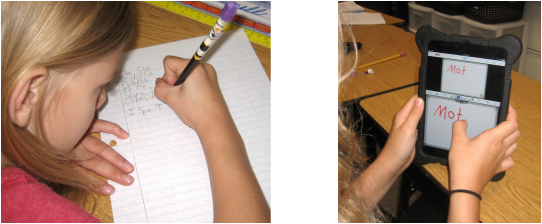|
Spelling is a subject to be taught, not assigned. Why? Effective spelling instruction helps children acquire critical reading skills, such as decoding, fluency, and vocabulary. It also enables children to become more fluent writers. While talking with teachers in schools and at presentations, on more than one occasion someone has said to me, “I don’t teach spelling. I don’t have time! I give the word list on Monday, the test on Friday, and that’s it. My students have to be responsible for studying for the test.” While I don’t take issue with the need for students to be responsible, I do object to teachers not teaching spelling, even as I understand why this happens. Burdened with loads of basal activity and not enough time, beleaguered teachers begin to sink under the weight of all there is to do. To stay afloat, they start heaving stuff off the sinking ship. Based on my experience, I’d say the instructional pieces most commonly tossed overboard are reading out loud, having students regularly read independently, having students pick their own topics and then write about them, and instructing deeply on spelling. An emphasis on “memorize and move on” and “one size fits all” may be another reason some teachers fall into assigning spelling rather than teaching it. Non-differentiated spelling programs with wide and unfocused lists make light of spelling-reading connections and underplay the importance of instruction, and "waste of time" worksheets masquerade as meaningful opportunities to practice. Fortunately, the burdens of too little time, too much to do, and “one size fits all” can be lightened without too much difficulty. Adopting a philosophy of differentiation and then giving a spelling inventory are good first steps. Focusing a spelling word list on 2-4 concepts and then fleshing it out with dozens words to accommodate a variety of spelling activities is also helpful. Finally, having a list of spelling strategies and a menu of teaching activities that support instructional efforts is also an excellent idea. In upcoming weeks, I hope to write about the ways we can teach spelling. This discussion will include how we might instruct on strategies that students can use daily to encode and decode words in writing and reading, as well as who we can teach students through spelling activities, of which some are exploratory, some are direct and explicit, and all are stimulating, engaging, and useful for teaching sound, pattern, and meaning, and for building the mind dictionary that all readers need for fluent reading. For now, and to wrap up this blog entry, I offer the aforementioned "list of spelling strategies and menu of teaching activities." Look for specifics on each in the weeks and months to come. List of Spelling Strategies that Good Spellers Use * Hear and spell sounds * Use a word you know * Think about the meaning * Use a mnemonic * See the word inside your head * Get close, circle, correct Menu of Spelling Activities that Teachers Can Use * Segment to Spell * Word Ladder * Look, Touch, Say * Word Card Sorts for Pattern and Meaning * Word Card Storytelling for Meaning * Word Dictation * Sentence Dictation * Practice Test with Instant Error Correction |
Mark WeaklandI am a teacher, literacy consultant, author, musician, nature lover, and life long learner.
|

 RSS Feed
RSS Feed